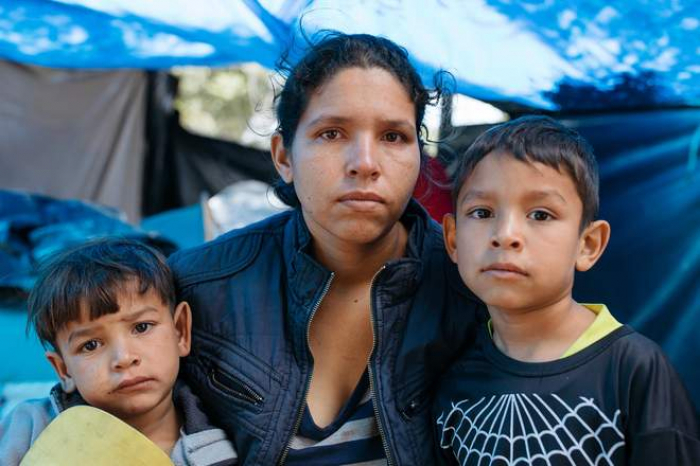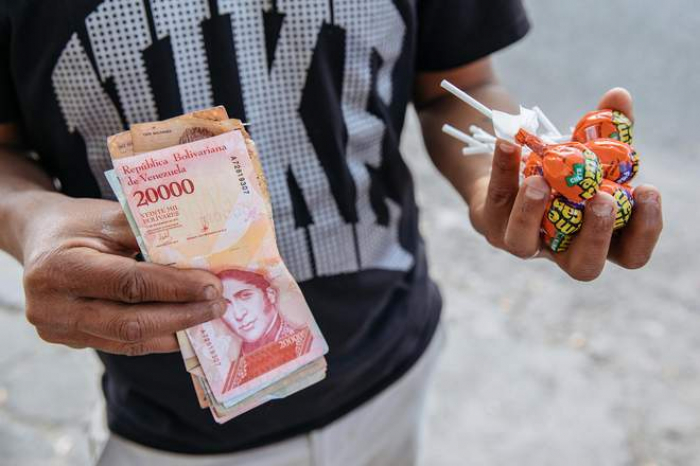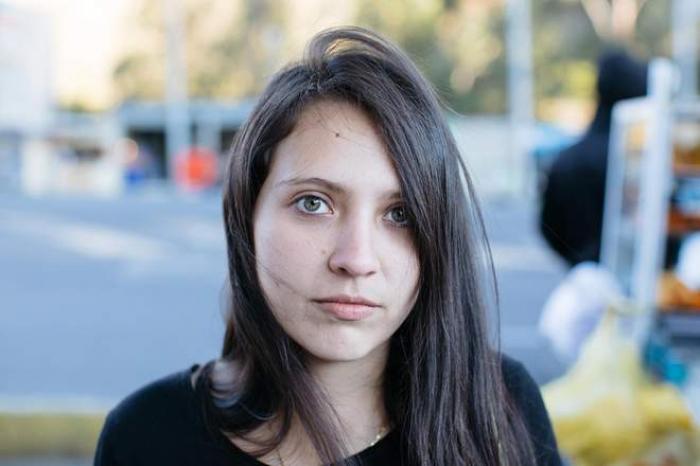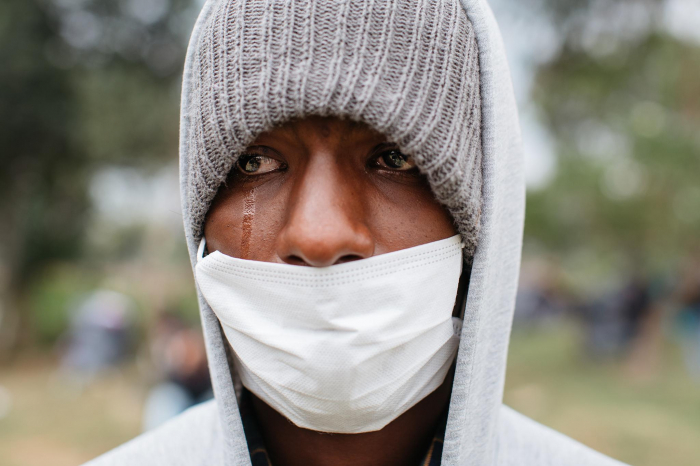Venezuelan president Nicolas Maduro feasts on steak dinners in exclusive restaurants while families in Venezuela eat from bins to survive. Communications minister Jorge Rodriguez’s comment in Ecuadorian newspaper El Comercio that “there is no humanitarian crisis in Venezuela, it’s false and it’s rubbish” shows the delusional rhetoric of a government in denial.
Nazareth Pirloiria, 27, sits outside her makeshift home near an overpass at Carcelen bus terminal in Quito. She waits patiently for public food donations from passersby; the blue plastic sheeting whips and cracks in the stiff morning breeze. She has walked 20 days through Columbia with her partner and her three young children, arriving penniless, hungry and exhausted. “We had to leave, there were no food or medicines available,” she says. “We starved for a whole week only eating green plantain skins which made us all sick.”
In a report, Alfred de Zayas, a UN human rights expert, said the crisis in Venezuela is economic, not humanitarian. The consequence, however, of this economic meltdown is a humanitarian crisis on an immense scale with the 2.6 million Venezuelans who have fled forced to lock the shutters and doors on the homes they cannot sell.
Venezuela is a wealthy country with the largest oil reserves in the world, estimated at around 300 billion barrels. But crippling hyperinflation is pushing the cost of household basics like rice to as much as three times an average monthly salary per kilogram. Mothers sleep overnight outside supermarket doorways to be first in line in the morning to have any chance of buying what food and household essentials they can afford from the half-empty shelves. Extreme shortages of food have meant that on average 75 per cent of Venezuelans have lost 11kg in bodyweight.

At the Department for Migration in Quito, Jomir, a former director at a public school in Venezuela, recalls having to certify the deaths of at least 30 children, from newborn to three-years-old, as a result of acute malnutrition. “Mothers did not have sufficient food to be able to breastfeed their babies, that and an inadequate supply of formula milk available meant there were so many hungry babies.” She sits back in her chair and her eyes fill with the emotion she has tried so hard to suppress.
Alex Moncada, country director at CARE Ecuador, explains: “The crisis in Venezuela will continue to cause the large-scale migration we are witnessing right now. Venezuelans forced by hunger, violence and lack of opportunities for a dignified life face stigma and discrimination in countries where local communities are also living on the threshold of poverty.”
Some two years ago, professionals and the middle class spilled over the borders into Venezuela, lapping up all the good jobs. Meanwhile, the exodus of the working class sees street vendors at every traffic light in Columbia, Ecuador and Peru.

Refugees arrive at the Rumichaca border crossing between Ecuador and Columbia, bewildered, emotional and exhausted, some of them walking the entire length of the country dragging and carrying what contents they could fit into makeshift luggage and bin bags. The “walkers”, as they are known, have trekked 20 days and 1,400km down through the mountain roads of El Paramo de Berlin, where 4,200m above sea level temperatures at night plummet to -15C.
Pedro Gomez, 50, proudly thrusts his Venezuelan passport through the bars of the steel barriers that herd them through the Columbian border control like cattle. “Why is nobody helping us? Why is no one here to see this?” Pedro’s family were one of the many that were forced to eat from bins to survive due to the scarcity of food. “Venezuelan immigration officers at security checked our bags and stole everything from us, money, medicines and jewellery. They are meant to help us… our own people.”
Bethzaz Roca, 23, an architecture graduate, sits on a bench at Rumichaca soaking up the last of the evening sun while she waits for a bus to take her to Quito. Like many other young Venezuelan women fleeing the crisis in their country she is vulnerable to xenophobia, becoming a victim of sexual harassment, gender-based violence or even trafficking.

Victoria looks to the floor, her eyes heavy with sadness. She explains how at times she fears for her life, and was once stabbed for resisting rape by a client in the back of a taxi as she tried to escape.
Karina Bravo at Plaperts, in partnership with CARE, runs workshops designed to specifically educate both men and woman to maintain a high standard of safety and hygiene in the sex industry. Participants, the majority of which are Venezuelan, receive entitlement to free healthcare services geared specifically towards sex work.
Venezuelan prostitutes are a third of the price. This lower tariff ensures that the market for prostitution is now more accessible to a larger clientele. Reports from Columbia’s busiest border town, Cucuta, is reporting a significantly higher number of cases of HIV and Aids.
More about: Vnezuela
















































